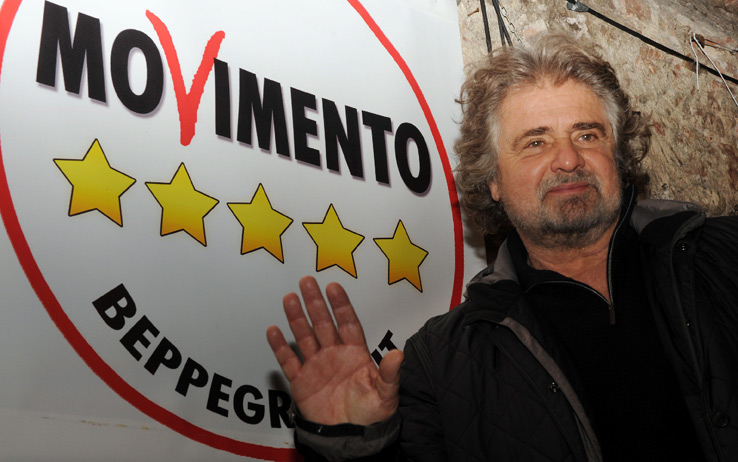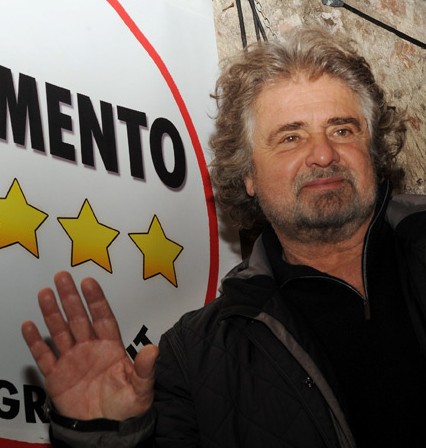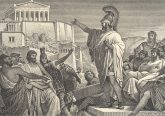
When an economic crisis combines high youth unemployment and an impoverished middle class, there is a real risk of a rise in right-wing extremism. But the left/right divide does not always help to understand European populism.
The Italian case is a particularly interesting one. After Berlusconi resigned in disgrace, the main two parties (Berlusconi’s People of Freedom-PDL and the centre-left Democratic Party-PD) were left with no choice but to support a ‘truce government’ of non-politicians and technocrats, led by Mario Monti. This unlikely arrangement froze the parliamentary majority.
But outside parliament the political system is in the middle of a storm. Berlusconi’s party is bordering balkanization, coming today only third in the polls, after the Democratic Party and the populist Five Star Movement. The Five Stars’ results are astonishing. The Movement was founded in 2009 by a stand-alone comedian, Beppe Grillo, advocating direct democracy, internet-based deliberative processes, environmentalism and the end of “professional politicians”. The movement grew slowly but steadily, especially in traditionally leftist regions in central Italy. Last October the Five Stars movement obtained their first significant result in southern Italy, scoring an impressive 18% in the Sicilian regional election. This was not the only surprise Sicily offered: Following the split of the centre-right incumbent coalition, an alliance between the centre-left and the centre won the regional election with 30% of the vote.
This victory emerged from a vote of disaffection rather than one of conviction. The rise of popular discontent was a warning sign. Turnout fell by 20% to a record low of 47%, and the Five Stars increased their votes by six times in real terms. Interestingly, the Five Stars do not seem to draw the bulk of their support from unconvinced voters who previously did not vote, nor from Berlusconi’s electorate. According to a study published by the Istituto Catteneo, a significant share of Five Stars votes come from individuals who supported centre-left parties in the past, if with little enthusiasm. The parties to the left of the Democratic Party, which were wiped out of parliament in the 2008 general election, have not yet recovered their credibility and they polled collectively at just 6%. Meanwhile, the bulk of the centre-right electorate simply fell out of love with Berlusconi and by and large deserted the polls. This trend is confirmed by national polls.
The Five Stars movement has been able to harness the growing anger aimed at the political class. The responsibility for the crisis is identified in turn with Berlusconi and his failure to deliver on the liberal revolution he repeatedly promised; with the Democratic Party which many saw as hopeless during the long years in opposition; and finally, with Mario Monti, whose technocratic government some perceive as the product of the economic establishment which created the crisis and is now passing the costs on to the middle class.
The greatest strength of the Five Stars movement is its network of genuinely motivated citizens who mobilize consensus by championing popular causes like anti-nuclear campaigns, direct political participation, renewable energy reform and the end of conflicts of interest between the public and the private sectors. This populist movement is substantially different from traditional right-wing or left-wing extremism. In his rampant and derogatory speeches Mr Grillo blames the crisis squarely on the political class, as if it acted in a separate and degenerate universe from the rest of Italian society.
Change in the air
The Five Stars will win a large parliamentary delegation at the next general election in spring, but it is impossible to say what will happen next. The movement has no real political experience and Mr Grillo seems only interested in pandering to the electorate’s gut-feelings, demanding on one hand a Federal Europe and on the another the return to a national currency.
What is clear is that there is a real demand for new forms of politics and political participation across the country. After a few months of indecision the centre-left coalition agreed to select its leader through real and contested open primaries. The Five Stars have a political manifesto which combines sensible notions of transparency with unrealistic, and indeed catastrophic, economic proposals. But they have the appeal – if not the substance – of an open political process. They also reflect an enthusiasm that Italian politics has sorely missed for more than a decade.
Umberto Marengo is a PhD candidate at POLIS, Cambridge University and is the Partner & Co-founder of Quorum, an Italian start-up specialising in opinion polls, political and market research.
A version of this post was published on Policy Network.








1 Comment